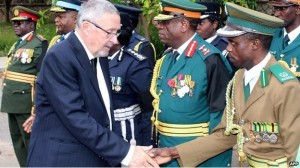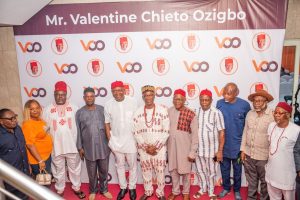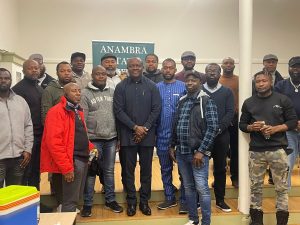Zambia’s new president may be white, but that’s not what makes him interesting

Zambia's Vice-President Guy Scott (L) greets defence and security chiefs; Photo Credit: BBC NEWS

Photo Credit: BBC NEWS
On Tuesday, Guy Scott was the vice president of Zambia. Now, he’s being hailed by many in the international press as the first white leader of a sub-Saharan African country since the fall of apartheid two decades ago (that’snot quite accurate).
Scott, 70, became president Wednesday after the death of his ally, President Michael Sata, in a London hospital. It’s an interim position; fresh elections are expected in 90 days. Scott says he is ineligible to contestbecause his parents, Scottish colonial settlers, were born outside the country.
Sata, a firebrand politician whose sharp tongue earned him the sobriquet “King Cobra,” picked Scott as his deputy in 2011. The appointment came after a hard-fought election campaign between Sata and then incumbent President Rupiah Bandah, a contest that was deeply divisive.
“Michael knows about political symbolism,” Scott told the Spectator magazine, a center-right British publication, in an interview in 2012. “It’s one in the eye for his critics who say he’s a tribalist. Obviously, he’s not.”
The pair’s closeness has now vaulted the Cambridge-educated Scott into an unusual perch. His political life began, in part, as a result of his father, who supported Zambian independence and became a member of parliament. The younger Scott served a stint as agriculture minister in the early 1990s and was credited with navigating Zambia out of a drought-spawned food crisis.
Scott described his appointment as president as a “bit of a shock to the system,” according to the Daily Telegraph, and labeled himself the first white democratic leader in Africa since “maybe the Venetians in the days when they ran the world” — a cheeky comment that’s a sign more of his irreverent banter than historical acumen.
Zambia was once the former British colony Northern Rhodesia (Southern Rhodesia is now Zimbabwe). Independent since 1964, the country has a reputation for being one of the more stable democracies in southern Africa. Whites number only around 40,000 of the country’s 13 million people, and a number of those arrived in the last decade, following the land seizures enacted by Zimbabwe’s President Robert Mugabe.
Scott is not as hard on Mugabe as many other white politicians in the region; Zambia’s government under Sata was seen as being close to the aging autocrat. In a 2013 interview with the Guardian, Scott even describedMugabe as an unwilling ruler, ready to hand over power in a democratic election. He spoke of Mugabe with a degree of affection: “He’s a funny chap,” said Scott. “He seems to doze off, and then he suddenly laughs at a joke while in the middle of dozing.”
In the same interview, Scott also was scathing about the region’s biggest player. “I hate South Africans,” he said, before recognizing “that’s not a fair thing to say because I like a lot of South Africans.” He explained, eventually: “I dislike South Africa for the same reason that Latin Americans dislike the United States, I think. It’s just too big and too unsubtle.”
Though Zambia is a relatively small country, it’s part of wider regional conversations. Most prominently, Sata and his supporters traded on anti-Chinese sentiment during their election campaign. China plays a huge role in the country’s economy, building infrastructure and retaining a massive stake in Zambia’s crucial mining sector — investments that some describe as a form of neo-imperialism.
![]()





